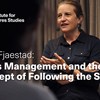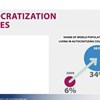arises

Expertise in crises
Governments are now reevaluating their post-pandemic preparedness. The project analyzes how society can use expertise to develop science-based policies in times of crisis.

Maja Fjaestad: Crises management and the concept of “following science”
Maja Fjaestad was state secretary for health in Sweden during the Covid 19 pandemic. Recently she published the book (with Emma Lennartsson) “Mitt i krisen” (In the Midst of the Crisis) (Volante, 2024

Lessons learned? Swedish preparedness for silent health crises and organizational learning after the swine flu, the heatwave, and the COVID-19 pandemic
This project aims to identify organizational conditions for efficient crisis management within intensive care units and special accommodations. It will also give recommendations on how the regions can strengthen their preparedness for silent health crises.
Agent-based social simulations for health crises response: utilising the everyday digital health perspective
Frontiers in Public Health Abstract There is increasing recognition of the role that artificial intelligence (AI) systems can play in managing health crises. One such approach, which allows for analysin

Research seminar with Maja Fjaestad: Post-pandemic reflections on leadership and preparedness: Crises management and the concept of “following science”
Venue: Institutet för framtidsstudier, Holländargatan 13, 4th floor, Stockholm, or online.Research seminar with Maja Fjaestad, IFFS researcher, expert coordinator at the Center for Health Crises at KI
The Pragmatics of Obscuring in Political Philosophy
Journal of Applied Philosophy Abstract According to the obscuring objection against mainstream political philosophy, there has been a long-standing dominant research paradigm focusing on distributive ju

What Future for Social Investment?
In a period of deep crisis, the question arises as to what kind of new strategies should be implemented to recover stronger growth, more and better jobs, and more equality and social cohesion. Reflexi

Anna Lührmann: Walking the Talk. Which Parties Threaten Democracy?
The recent increase of democratic declines around the world has sparked a new generation of studies on the topic. Scholars agree that these days the main threat to democracy arises from democratically
Completed: Criminal networks and social organizing
How does criminal organization, for example in street gangs, arise? By understanding how the networks work, we can also suggest crime prevention strategies.
Edward Page: Addressing future loss and damage associated with climate change
Edward Page, Associate Professor of Political Theory, University of Warwick ABSTRACTClimate change, by damaging the quality of life of populations already suffering from acute vulnerability and hardshi the adoption of measures of mitigation and adaptation and a ‘second-order injustice’ if the associated losses and damages arise as of these measures. Both forms of injustice involve ‘losses and damages’ arising that would not have occurred but for climate change but raise distinct normative problems given their diverging origins. This research seminar explores some key normative puzzles raised by the new ethics and politics of ‘loss and damage’ as it relates to both first-order and second-order climate change injustice. In particular, the lecture focuses on which normative principles should guide measures seeking to address first-order and second-order climate change injustices experienced by states and how (if at all) new forms of policy can be designed that respect these principles.








